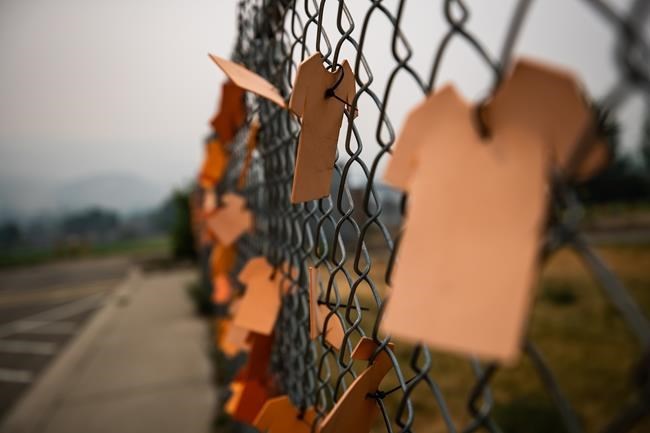QUESNEL, B.C. — Councillors in Quesnel, B.C., voted unanimously to censure their mayor, saying his actions related to a book that denies the harms of Canada's residential school system have jeopardized the city's relationship with Indigenous communities.
Coun. Scott Elliott made the motion, saying all the work that has been done to rebrand the city has been "demolished" by Mayor Ron Paull's actions.
"This should never have happened," Elliott said, adding he hoped Tuesday's meeting would mark the start of a path to repair relationships between Indigenous Peoples and the city in B.C.'s Interior, about 120 kilometres south of Prince George.
"We've had elders sit in here and explain what happened at residential schools, and having their children taken away, and then what took place there, and I just can't fathom that we have to go back to this," Elliott told the mayor and council.
A report to council says Paull "attempted to distribute" a copy of the book, titled "Grave Error: How the Media Misled Us (and the Truth about Residential Schools)," at a Cariboo Regional District board meeting where he was representing the city.
Paull denied "distributing" the book and told Tuesday's meeting that his work on advancing reconciliation with Indigenous Peoples is a matter of public record.
The book's editors introduce it as a response to "moral panic unleashed" after the Tk'emlups te Secwepemc First Nation announced in May 2021 that it had identified what it believed to be the unmarked graves of more than 200 children at the site of a former residential school in Kamloops, B.C.
The revelation from the First Nation sparked a countrywide awakening about some of the darkest chapters in Canada's history.
Quesnel council voted to pass the motion censuring the mayor after Paull left the room on Tuesday. The motion says he had "damaged the relationship" between the city and Indigenous communities, including the Lhtako Dene Nation.
It also says Paull's actions were "disrespectful to the history of residential schools" and contrary to the city's goals of mutual respect and reconciliation.
The councillors then voted unanimously on a motion placing sanctions on the mayor, including not allowing him to represent the city at the Cariboo Regional District and Northern Development Initiative Trust.
Paull has also been removed from city committees, and his travel budget for conferences such as the Union of B.C. Municipalities gathering has been suspended.
The council agreed to revisit the sanctions in 90 days.
Prior to the votes, the mayor read a letter saying he brought his wife's copy of the book to a Cariboo Regional District meeting and showed it to two colleagues in the context of wondering what the district's library might do with it.
Paull said he would give those "launching this charge" against him "the benefit of the doubt," adding "thisis all based on a misunderstanding."
He said one of his colleagues claimed he had referred to the book as a "good read," but he has not read it so he couldn't have made such a direct statement.
"I do recall, however, saying that according to the online reviews of the book, many reviewers noted the book as a 'good read,'" Paull said in his letter to council.
The mayor apologized for "picking the wrong book" to bring to the regional district meeting in nearby Williams Lake, B.C., saying he "didn't mean any harm."
Speaking in favour of censuring the mayor, Coun. Laurey-Ann Roodenburg said Paull's actions carry potential financial consequences for the city.
Quesnel has received money from the province after agreeing to Indigenous engagement requirements related to emergency and disaster management, she said, and if they city can't fulfil its responsibilities, it would have to return the funds.
She noted the Lhtako Dene Nation has passed a resolution saying it would continue working with city councillors, but it would no longer work with the mayor, who has been banned from entering the nation's territory unless he is invited.
The resolution dated April 17, 2024, says Paull condoned the distribution of the book that implies "cultural genocide did not happen" at residential schools.
The agenda for Tuesday's council meeting also includes a transcript of remarks by Lhtako Dene Chief Clifford Lebrun from a meeting earlier in April, where elders and other members of the nation voiced their concerns about the situation.
"This definitely hurts our people," the transcript said. "Not just the survivors that have to relive it again and wounds that have just been healed a little bit from the findings," he said, referring to the revelations about unmarked graves in residential school sites across Canada.
A report from the Truth and Reconciliation Commission detailed the emotional, physical and sexual abuse of children at Canada's residential schools. The commission has documented at least 4,100 deaths at the institutions.
Canada had more than 130 residential schools, with the last one closing in 1996.
— By Brenna Owen in Vancouver
This report by The Canadian Press was first published May 2, 2024.
The Canadian Press




